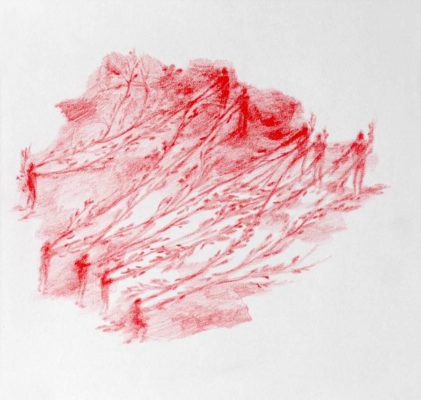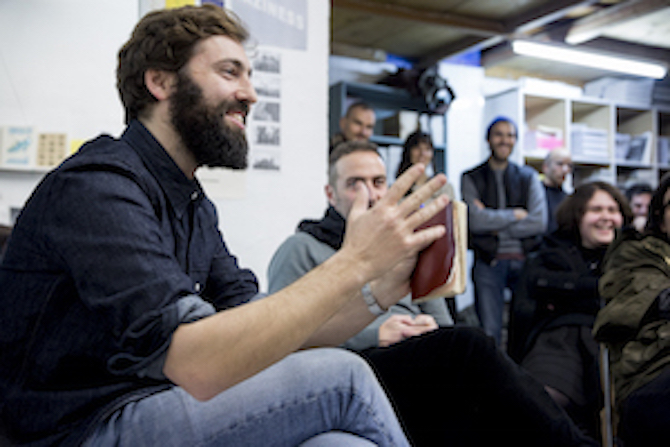Search
To search for an exact match, type the word or phrase you want in quotation marks.
A*DESK has been offering since 2002 contents about criticism and contemporary art. A*DESK has become consolidated thanks to all those who have believed in the project, all those who have followed us, debating, participating and collaborating. Many people have collaborated with A*DESK, and continue to do so. Their efforts, knowledge and belief in the project are what make it grow internationally. At A*DESK we have also generated work for over one hundred professionals in culture, from small collaborations with reviews and classes, to more prolonged and intense collaborations.
At A*DESK we believe in the need for free and universal access to culture and knowledge. We want to carry on being independent, remaining open to more ideas and opinions. If you believe in A*DESK, we need your backing to be able to continue. You can now participate in the project by supporting it. You can choose how much you want to contribute to the project.
You can decide how much you want to bring to the project.

In the future, we will remember where we were on the day we were confined, just as we remember those moments that changed our lives as a society. In early 2020, few imagined what awaited us. Now, after months of confinement, prolonged lockdowns in some regions and attempts at reopening in others that seem doomed to confine us at home again, one thing seems certain: the world will never be the same again.
These days, life oscillates between trying to recover a certain memory routine and realizing at all times that nothing is the same anymore. The messages crossed with friends from here and there show the planetary complexity, the expansive temporality of the virus, the physical implications at the time of its propagation. I cannot stop thinking about what it means in terms of social control and geopolitical implications, how it affects in some geographies and in others, in some social classes and in others; in the difficulty of managing the responsibility that is being placed on the citizen before the disease, the complicated relationship of the communities with their government or in the control measures applied never seen before, as well as how little we are going to care if they track the locations of our mobiles to control de virus.
On a personal level, the experience of the confinement, the uncertainty and the fear of the disease, brings with it many doubts and a certainty: better closer together. Mutual support, the strengthening of neighborhood ties, the articulation of close and distant alliances and the implementation of support networks for the most disadvantaged communities that help us move in this scenario further demonstrate something we already knew: the need to imagine and strengthen support structures, forms of care and vital organizations that challenge the era of social distancing and biopolitical control, while taking care of the virus and its consequences.
Therefore, when I received the invitation from A*DESK to work as a guest editor in the midst of this situation, the idea could not be other than to invite a number of people to think and meditate from the artistic and cultural field around all these issues during this complicated month of July 2020, hence the four texts that describe different problematic ideas and experiences that must be heard regarding the challenges to come. We start from Argentina with “Bananas” by Duen Sacchi, a story that through the history of the United Fruit Company and its interventionists practices in Latin American realities from extractive and exploitative logics, exposes the complexity of imagining possible communities that overcome the colonial core ideas. Let the bug not confuse us; the banana was already there, and this is an essential challenge if we really want to build in different ways from what has brought us here. “There is a Banana involved in order to imagine and to get together in community”.
We continue with “The institution as ideology”, a text by the Palestinian artist Yazan Khalili, in which he talks about his experience re-imagining a local cultural institution in Ramallah, keeping it relevant and anchored in the reality of the occupied territories and transforming a funding crisis into a cultural and political issue capable of articulating a useful tool for the community. “These changes reversed our understanding of sustainability; the distance between the community and the institution collapsed and a new structure was imagined, one that does not have a steep hierarchy like a mountain or a flat one like coast, but one that looks like the West Bank hills, where the relationship between the team, the collective and the individual is always balanced and in motion”.
From Barcelona, the Larre collective formed by Lara García Díaz, Priscila Clementti and Ángela Palacios proposes with “A voice to be all voices, a text to be all texts”, a writing that puts together an opinion text with extracts from their conversations on WhatsApp, intertwining the different layers that go through the act and the writing times. A series of reflections in real time on issues related to care, which are mixed together with everyday personal reactions. “As we said at the beginning, if the privatization of life-supporting structures and the precariousness to which they are subjected have placed the urgency and the indispensability of mutual support structures in the spotlight in order to cope with the sustainability of our lives in the face of a pandemic, it is now more urgent than ever to continue to collectivize all the experiences lived these last months, as well as those that precede us. In this way, we will be able to map and detect the tools needed to ensure sustainable forms of care in line with the ways of life that we decide on together”.
And we end with “I am here to make good trouble!”, a conversation with the curator Ryan N. Dennis in which we discuss the possibilities that open up from some practices to strengthen and revitalize certain disadvantaged communities. “I am committed to working with Black artists, people of color and those individuals that have historically been on the margins – they are my center. As a curator, I think of myself as an advocate but also a co-conspirator with the artist. I am here to learn and I reject the idea of being a gatekeeper because I want to be as inclusive and build supportive networks as much as possible. I also believe my role as a curator is to create new systems and structures within and outside of the institution. The art is a multi-layered microcosm that needs active disruption!”.
Four proposals that open up a vast number of issues that we must address if we want to tackle the challenges that lie ahead. We live in turbulent times, in which everything is confused and the real battles are blurred by the control of the urgent. We need to imagine communities that can build forms of resistance to the dynamics that have dragged us into the estrangement. We need to be stronger; we need to be closer together than ever.
(Featured Image: Rita Ponce de León, Unitierra 2 –Hutzin, Elvia, Lisbeth, Clemente, Porfirio, Irene, Gustavo, Erika, Yaxché, Martin, Patricia, Irene, Oscar, Laura, Toni, Maia, Rita, 2015)

Juan Canela is chief curator is at the Museo de Arte Contemporáneo de Panamá. He works with artists and other people. He understands curatorial practice as a practice in which ideas, concepts and contents come into play, but also working structures, rhythms, models and ways of life. If it seems that there is no possible future, perhaps from here we can close our eyes and intuit one.
"A desk is a dangerous place from which to watch the world" (John Le Carré)